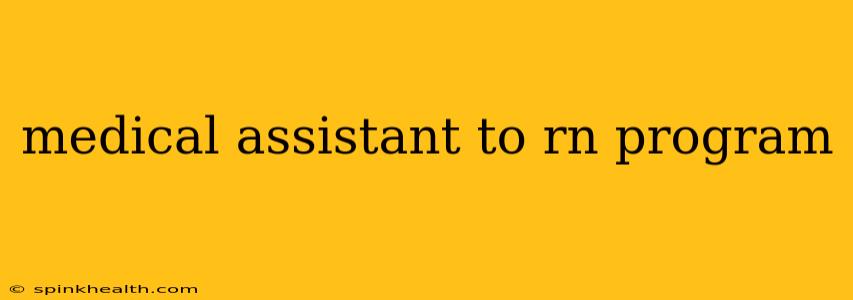The crisp white coat, the reassuring smile, the unwavering dedication – these are the hallmarks of a Registered Nurse (RN). For many medical assistants (MAs), the path to becoming an RN feels like a natural progression, a chance to expand their skills and deepen their impact on patient care. But the journey isn't always straightforward. This comprehensive guide will navigate you through the process, answering your most pressing questions and offering insights into what it takes to successfully transition from a medical assistant to a registered nurse.
My name is Sarah, and I've been an RN for over a decade. I started my career as a medical assistant, and the experiences I gained during those early years were invaluable in shaping my nursing career. This post is based on my personal journey, combined with extensive research on successful MA-to-RN transitions.
What are the educational requirements to become an RN after being a Medical Assistant?
This is often the first hurdle for aspiring RNs with an MA background. Unlike some other healthcare professions, becoming an RN requires a significant investment in education. You won't be able to simply add on a few certifications. The most common pathways include:
-
Associate Degree in Nursing (ADN): This is a two-year program, often considered a faster route to licensure. Many community colleges offer ADNs, making them a more accessible option for many MAs. Your prior experience as an MA could potentially help you accelerate through some coursework.
-
Bachelor of Science in Nursing (BSN): This is a four-year program offering a more comprehensive education and potentially better career advancement opportunities down the line. Some universities offer accelerated BSN programs specifically designed for individuals with prior healthcare experience, significantly shortening the overall time commitment.
-
RN to BSN programs: If you already have an ADN, many universities offer RN to BSN programs that allow you to upgrade your qualifications. This can provide an opportunity to gain a more comprehensive skillset.
What prerequisites do I need to meet for an RN program?
Prerequisites vary between schools, but common requirements include:
- High school diploma or GED: This is a fundamental requirement for almost all nursing programs.
- Completed prerequisite courses: These usually include biology, chemistry, anatomy, and physiology. Your experience as an MA may allow you to waive some of these depending on the institution.
- Minimum GPA: Nursing schools are highly competitive, so maintaining a strong GPA is essential.
- Background check and drug screening: These are standard for any healthcare profession.
- Healthcare experience: While not always mandatory, your experience as a medical assistant is a significant advantage. Highlight this experience in your application.
What are the advantages of having prior experience as an MA when applying to RN programs?
Your MA experience is a powerful asset. It showcases your dedication to healthcare, your familiarity with clinical settings, and your foundational knowledge of medical procedures and terminology. This sets you apart from applicants who lack this practical experience. Admission committees often value this real-world experience, potentially increasing your chances of acceptance.
What is the best way to prepare for an RN program after working as an MA?
Beyond meeting the prerequisites, preparation involves:
- Reviewing fundamental science concepts: Brush up on your biology, chemistry, and anatomy knowledge to succeed in your nursing program.
- Strengthening your study skills: Nursing school demands a high level of dedication and effective study habits.
- Networking with nurses: Connecting with working nurses can provide valuable insights into the profession.
- Shadowing RNs: Observing experienced RNs in action can give you a better understanding of the daily tasks and responsibilities.
How much does a medical assistant to RN program cost?
The cost of an ADN or BSN program varies considerably depending on the institution and location. Factors to consider include tuition fees, books, supplies, and living expenses. Exploring financial aid options, such as scholarships and loans, is crucial for managing the financial burden.
How long does it take to become an RN after being a Medical Assistant?
The duration depends on the program you choose. An ADN typically takes two years, while a BSN takes four. Accelerated programs for individuals with prior healthcare experience can shorten the timeline.
This journey from medical assistant to registered nurse is challenging but incredibly rewarding. Your existing experience provides a strong foundation, and with dedication and strategic planning, you can successfully navigate the path to achieving your nursing goals. Remember to research different programs carefully, connect with current nursing students and professionals, and remain persistent in your pursuit of this fulfilling career. Good luck on your journey!

